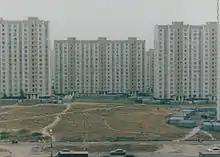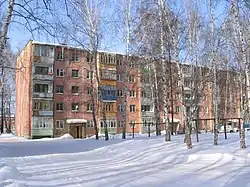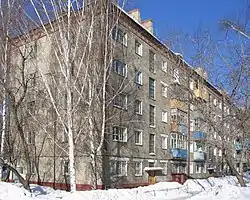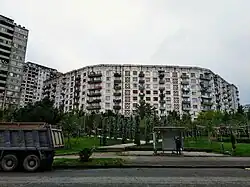Panel buildings in Russia
In Russia, systematic construction of large panel system-buildings (Ru:Панельное домостроение Panel'noye domostroyeniye, Latinized:Panel'noye domostroyeniye Panel'noye domostroyeniye or panely dom) begun in the Former Soviet Union and continued into modern Russia to provide fast and cheap housing. Historical types are Khrushchyovka and Brezhnevka (both originated the Former Soviet Union). They were originally planned to augment the Stalin-era buildings (Stalinkas) and kommunalkas (shared apartments).

Khrushchyovka


A khrushchevka (Russian: хрущёвка, tr. khrushchyovka, IPA: [xrʊˈɕːɵfkə]) is a type of low-cost, concrete-paneled or brick three- to five-storied apartment building which was developed in the Soviet Union during the early 1960s, during the time its namesake Nikita Khrushchev directed the Soviet government.[1] Khrushchevkas are sometimes compared to the Japanese danchi,[2] similar (often government-sponsored) housing projects from the same period, which by some accounts were directly inspired by them.[2] Preceding this type of housing, the majority of the Soviet housing stock was of low-rise communal apartments. Khrushchevka"s had from two to five floors.
The Soviet government developed khrushchevka apartments as part of self-contained microdistrict (Russian: микрорайо́н, mikrorajón En:microraion), which contain green areas, playgrounds, schools, shops, medical offices, transport infrastructure, and more. [3]
Brezhnevka

A brezhnevka, (Ru:Брежневка) is a panel or brick apartment building that was built in the Soviet Union from 1960–1980 under the leadership of Leonid Brezhnev, after whom the building type is named.[4] The brezhnevka originated because of a desire for an update to the khrushchevka. As the needs of the population increased, so did the need to build updated housing. There are about 40 series of the brezhnevka.[5] Common nine story versions are referred to as 'девятиэтажка' ('devyatietazhka', literally 'nine-storeyer').[6][7]
Notes
- Aronov, Nikita & Razmakhnin, Anton (March 13, 2008). "Revamping Khrushchev's Legacy". Johnson's Russia List. Archived from the original on June 4, 2011.
- Knoroz, Tatiana (October 16, 2019). "Эффект Данчи: Почему Японские Хрущевки Стали Непригодны Для Жизни" [Danchi Effect: Why Japanese Khrushchyovkas have become unlivable]. Strelka (in Russian). Archived from the original on 8 March 2021. Retrieved 13 January 2020.
- https://expatriant.com/types-of-russian-apartments/
- OBRAZKOVA, MARINA. "A look at Soviet-era housing". rbth.com. Retrieved 18 March 2023.
- Ivashchenko, Srbui. "Brezhnevka: description, characteristics, layout". els24-com. Retrieved 21 March 2023.
- https://www.reddit.com/media?url=https%3A%2F%2Fi.redd.it%2F6y7oe6cr0tv41.jpg
- https://novostroev.ru/other/doma-serii-1-515-9sh/